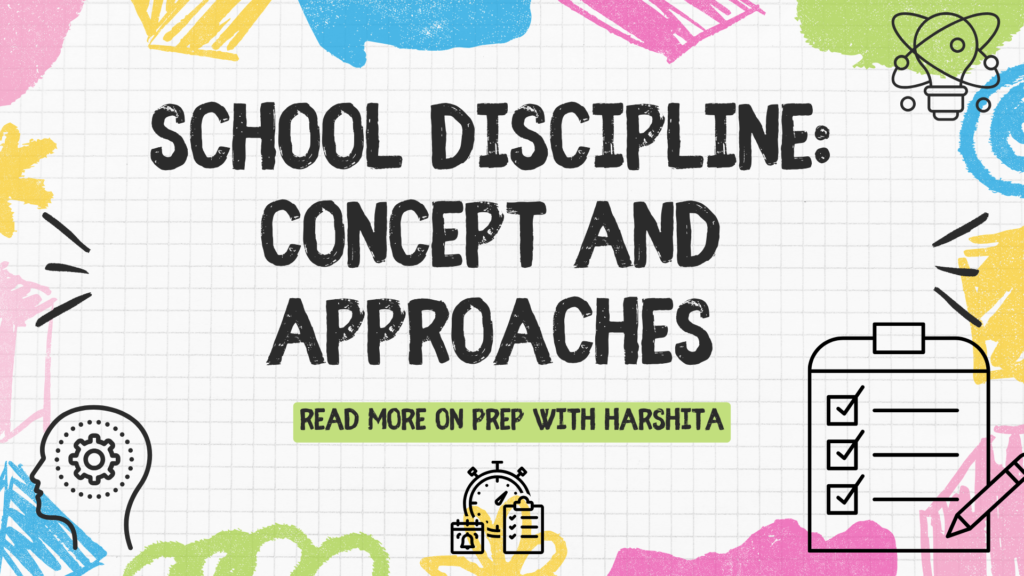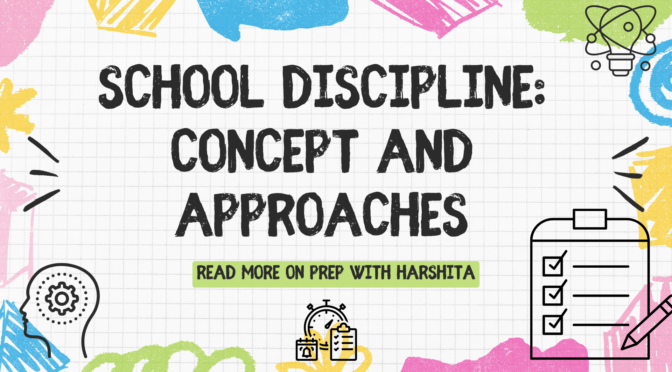School discipline refers to the system of rules, strategies, and consequences implemented in educational settings to maintain order, promote a safe learning environment, and develop positive behavior among students.
The concept of school discipline includes various approaches that can be broadly categorized into punitive and positive methods. The ultimate goal of school discipline is to create a conducive atmosphere for effective teaching and learning while supporting students in their social and emotional development.
Approaches to School Discipline:
Punitive Discipline:
- Detention: Students may be required to stay after school as a consequence for misbehavior.
- Suspension: Temporary removal of a student from regular classes due to severe misconduct.
- Expulsion: Permanent removal of a student from the school due to serious violations.
Positive Discipline:
- Conflict Resolution: Teaches students skills to resolve conflicts peacefully and engage in effective communication.
- Peer Mediation: Employs trained students to mediate conflicts between their peers, promoting understanding and resolution.
- Counseling and Guidance: Providing counseling services to students who may be struggling with personal or academic issues.
Also Read: Role of Parent-Teacher Association
Behavioral Interventions:
- Behavioral Contracts: Written agreements between students and teachers outlining expected behavior and consequences.
- Behavioral Modification Plans: Individualized plans to address specific behavioral issues, often involving positive reinforcement.
Classroom Management:
- Clear Expectations: Establishing and communicating clear rules and expectations for behavior in the classroom.
- Consistent Consequences: Applying consequences consistently and fairly to reinforce the importance of adhering to rules.
- Positive Reinforcement: Recognizing and rewarding positive behavior to encourage its continuation.
Preventive Measures:
- Character Education: Incorporating lessons on values, ethics, and responsible behavior into the curriculum.
- Social-Emotional Learning (SEL): Integrating programs that focus on developing students’ emotional intelligence and interpersonal skills.
- Anti-Bullying Programs: Implementing strategies to prevent and address bullying behavior.
Teacher Training:
Professional Development: Providing teachers with training on effective classroom management, conflict resolution, and understanding diverse student needs.
Collaboration with Parents:
- Parental Involvement: Encouraging parents to actively participate in their children’s education and reinforcing positive behavior at home.
- Parent-Teacher Conferences: Providing opportunities for open communication between parents and teachers regarding a student’s behavior and academic progress.
Also Visit: Prep with Harshita



Vibracion del motor
Equipos de balanceo: fundamental para el operación fluido y efectivo de las máquinas.
En el entorno de la tecnología avanzada, donde la rendimiento y la fiabilidad del aparato son de alta significancia, los dispositivos de equilibrado cumplen un tarea crucial. Estos equipos especializados están diseñados para calibrar y estabilizar componentes móviles, ya sea en maquinaria de fábrica, automóviles de movilidad o incluso en electrodomésticos hogareños.
Para los técnicos en reparación de dispositivos y los ingenieros, trabajar con aparatos de balanceo es crucial para proteger el operación estable y fiable de cualquier aparato rotativo. Gracias a estas soluciones avanzadas sofisticadas, es posible minimizar notablemente las vibraciones, el estruendo y la carga sobre los rodamientos, aumentando la tiempo de servicio de componentes caros.
Igualmente trascendental es el papel que tienen los sistemas de equilibrado en la soporte al comprador. El asistencia experto y el conservación regular empleando estos dispositivos habilitan proporcionar prestaciones de excelente excelencia, mejorando la bienestar de los clientes.
Para los propietarios de negocios, la inversión en estaciones de ajuste y dispositivos puede ser importante para incrementar la productividad y eficiencia de sus dispositivos. Esto es principalmente importante para los empresarios que dirigen reducidas y medianas organizaciones, donde cada punto es relevante.
Además, los dispositivos de equilibrado tienen una vasta implementación en el campo de la seguridad y el gestión de nivel. Habilitan localizar probables defectos, impidiendo reparaciones elevadas y daños a los sistemas. También, los información obtenidos de estos aparatos pueden aplicarse para perfeccionar métodos y aumentar la presencia en sistemas de investigación.
Las sectores de utilización de los dispositivos de ajuste comprenden múltiples sectores, desde la manufactura de vehículos de dos ruedas hasta el supervisión del medio ambiente. No importa si se trata de extensas fabricaciones industriales o reducidos locales domésticos, los aparatos de balanceo son esenciales para garantizar un funcionamiento productivo y sin presencia de interrupciones.
La máquina de equilibrado Balanset-1A constituye el logro de años de trabajo duro y dedicación.
Como desarrolladores de este sistema innovador, tenemos el honor de cada modelo que se distribuye de nuestras fábricas.
No se trata únicamente de un bien, sino además una herramienta que hemos mejorado constantemente para abordar inconvenientes complejos relacionados con desbalances en máquinas dinámicas.
Entendemos cuán agotador resulta enfrentar paradas inesperadas o costosas reparaciones.
Por este motivo desarrollamos Balanset-1A centrándonos en los requerimientos prácticos de los usuarios finales. ❤️
Comercializamos Balanset 1A directamente desde nuestras sedes en Portugal , España y Argentina , asegurando entregas rápidas y eficientes a destinos internacionales sin excepción.
Los colaboradores en cada zona están siempre disponibles para proporcionar ayuda técnica especializada y orientación en el lenguaje que prefieras.
¡No somos solo una empresa, sino un equipo que está aquí para asistirte!